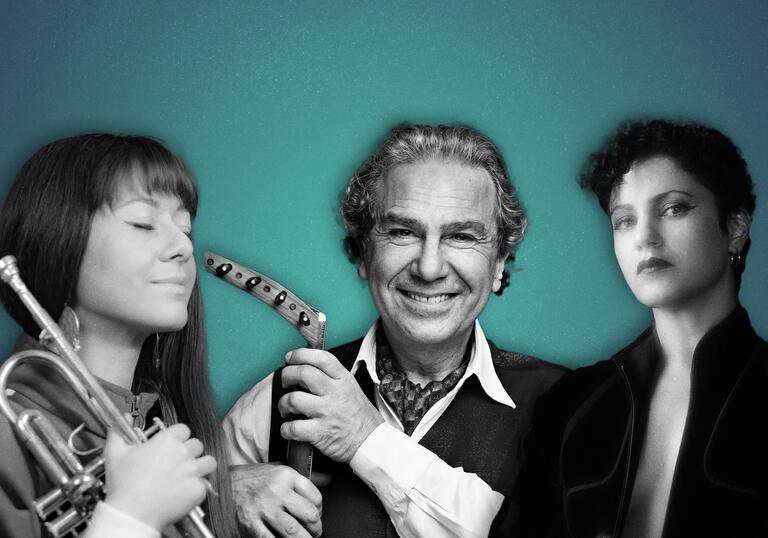Yazz Ahmed with Emel and Rabih Abou-Khalil: An evening of contemporary Arabic music

Oumar Saleh sits down with award-winning British-Bahraini trumpeter Yazz Ahmed and legendary Lebanese Oudist, Rabih Abou-Khalil, ahead of their collaborative evening of contemporary Arabic music alongside Tunisian avant-garde singer songwriter Emel.
It took a while for Yazz Ahmed to truly express herself. Before embarking on an acclaimed career that also saw her record and perform with Radiohead, Lee “Scratch” Perry, and These New Puritans, the talented trumpeter and flugelhornist struggled to find guidance from the birthplace of jazz. ‘Even though I tried my best to play like the American greats, it wasn’t in my heart,’ she recalls. ‘I’m not American, so it was hard for me to find a personal voice.’
Born in London, Yazz spent her formative years in Bahrain before returning to England aged nine. Inspired by her maternal grandfather Terry Brown, a record producer and jazz trumpeter who played with Tubby Hayes, Ronnie Scott, and the original Johnny Dankworth Seven, she would embark on a quest to unite melodic Arabic music and the 50s & 60s British jazz on repeat growing up. Debuting in 2011 with the intimate Finding My Way Home, she would later gain international recognition in 2017 with La Saboteuse — a trippy call back to Miles Davis’ Bitches Brew which also marked her first real foray into mixing electronica and psychedelic prog rock into her compositions. Her last album as a bandleader was 2019’s Polyhymnia, a cosmic six-track opus dedicated to courageous women throughout history, and is her most expansive project to date.
However, it wasn’t until she discovered Lebanese oudist Rabih Abou-Khalil as a teenager that she grew the confidence to create her own unique compositions. ‘I couldn’t find anything inside until I found Rabih’s Blue Camel, which also features my favourite trumpet player Kenny Wheeler,’ she reminisces. ‘Listening to that album made me realise that I can mix my two musical heritages. It was a real cathartic moment for me, because for a long time, I kind of felt like I didn’t fit in anywhere.’
While the genre-blending Blue Camel — christened by fans and critics as a ‘new Kind of Blue’ upon its 1992 release — is considered to be his masterpiece, Rabih didn’t foresee the seminal impact it would have on modern-day ethno jazz. ‘I wasn’t even attempting to do anything,’ he explains. ‘For me, music was always an emotional and artistic expression, not a stylistic one, and I grew up listening to all kinds of music without being aware of genres or classifications. So when I did Blue Camel, I just wanted to play my music, and the only musicians who were open to other stuff were jazz artists.’
Rabih has long been hailed as an inventive trailblazer who was a ‘world musician’ well before it became a tag. After learning to play the oud — a fretless Lebanese lute — as a youngster in Beirut, he studied classical flute in Munich during the Lebanese Civil War in 1978. He would later return to the oud in an attempt to explore novel ways to play Arabic music whilst infusing jazz sensibilities into his work, centred around his ethos of using music as a way to bridge cultural divides throughout a career spanning over 30 years.
‘For me, the only big innovation of the 20th century was the meeting of different cultures,’ he says. ‘People learn from each other, and this meeting of cultures is how styles develop in different directions. It’s not a conscious effort to mix things together though, as I look for musical personalities who I think I can work with. It’s a little bit like searching for friends in that if I want to invite people for dinner, I pick people who can communicate with each other.’
Rounding off tonight’s performance is Tunisian singer-songwriter Emel, renowned for her haunting voice that adds an emotional context that reverberates through her protest songs. In 2012, she achieved mainstream recognition by channelling Joan Baez — a pivotal influence throughout her career — in ‘Kelmti Horra (My Word is Free)’, an evocative anthem that struck a chord with those affected by the Arab Spring. Much like Yazz and Rabih, Emel’s work is a hypnotic marriage of traditional Arabic folk with sweeping electronica, telling the Guardian in 2017 that she ‘wanted [her] beats to be born where [she] was, and then encounter the modern world.’
Emel’s eclectic oeuvre adds further credence to Yazz’s mission to subvert stereotypes about music from the MENA region, intent on promoting the genre to those unfamiliar with its beguiling melodies and resonant ballads. ‘A lot of people might associate Arabic music with divas like Fairuz and Umm Kulthum, and Western audiences don’t really get much of an opportunity to discover that jazz can seamlessly mix with such music,’ Yazz muses. ‘I’d like to think that my work is introducing those elements, and perhaps fans may be intrigued enough to seek out other types of Arabic music.’
In what would be her first show at the Barbican as a soloist, Yazz’s excitement is heightened by sharing the stage with two musicians she holds in high regard. ‘The music I write today wouldn’t exist if it wasn’t for Rabih, and Emel’s music, which sheds light on social issues such as the Arab Spring in Tunisia and Iranian women’s struggles for freedom, is very powerful,’ she says. ‘They’re both artists I greatly admire, and it’s a beautiful mix of different styles but all from the Arab world, so it’s definitely going to be a fun and intriguing experience.’
Details
Performers
Yazz Ahmed vocals
Rabih Abou-Khalil oud
Emel vocals
